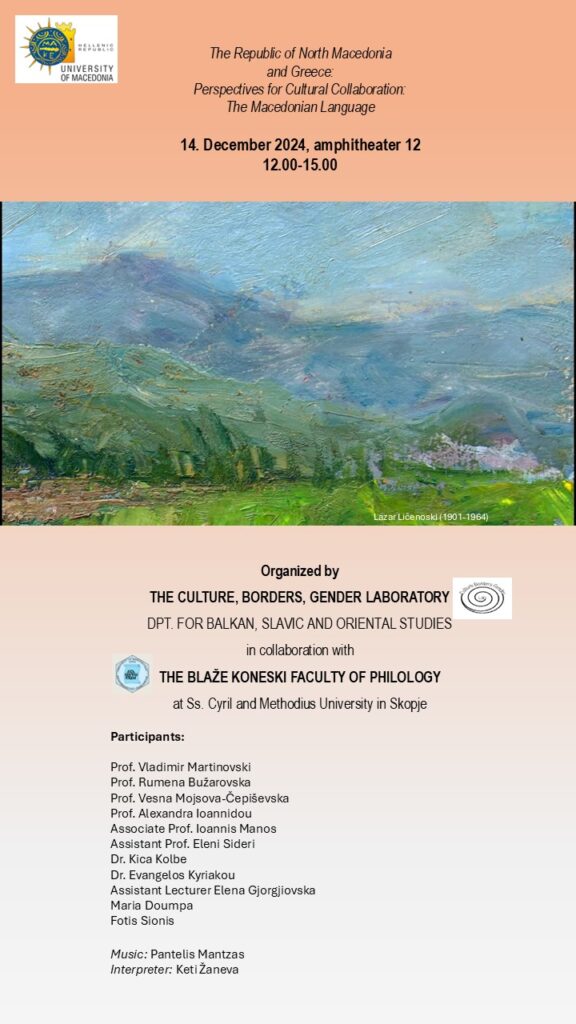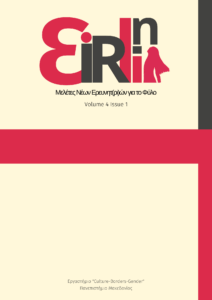
 admin
admin
The third volume of the journal Culture-Borders-Gender/Studies
https://ojs.lib.uom.gr/index.php/cbgs/index
Contents
Anthropology in the city: ethnographic approaches and critical perspectives on “neighbourhood”
Ioannis Manos
Conceptualizations and practices of ‘Corruption’ in the cultural context of post-war development and modernization processes in Greece – a case study of the former refugee settlement of Kato Toumba, Thessaloniki
Miltiadis Zerboulis
A century of refugee movement, 1922–2022: the 100memories research project
Eleni Kyramargiou, Olga Lafazani
The coffeeshops, the exchangeable property, the crisis – The Efimeris ton Valkanion (Newspaper of the Balkans) in Ano Poli: a series of articles in the spring of 1933
Yorgos Koumaridis
The wall as a housing threshold for refugees: the case of kastroplikta in Ano Poli, Thessaloniki
Haris Tsavdaroglou
Μετακινούμενες, εργαζόμενες στην κατασκευή ενδυμάτων στη Θεσσαλονίκη
Elina Kapetanaki
Transformations of an urban «neighborhood» in the center of Thessaloniki: an auto-ethnographic account
Eleftheria Deltsou
Between the local and the transnational: proximities and encounters of post-soviet Greeks in search of a cultural ‘familiarity’
Dimitris Kataiftsis, Tasos Grigorakis
From below – within the walls
Pafsanias Karathanasis
MOMus – Museum of Modern Art: an international museum in Western Thessaloniki
Maria Tsantsanoglou
Ano Poli in photography from the 20th to the 21st century: politics of nostalgia and urban branding
Evi Papadopoulou
Dowry dialogues: displacement and memory in the work of Persefoni Myrtsou and Adi Liraz
Christina Grammatikopoulou
Television representations of the neighbourhood, nostalgia, and cultural memory
Eleni Sideri
Atelier anti-tour inside/outside the walls of Thessaloniki: pilgrimage/tour in the neighborhoods of the absent, the invisible and the subaltern bodies
Fotini Tsibiridou
Call for applications for the Summer school: Religious Interactions, Juxtapositions and Imbrications in the Mediterranean and the Balkans: Ritualities, Materialities, Representations,
June 30 – July 4, 2025, at the French School of Athens (Greece).
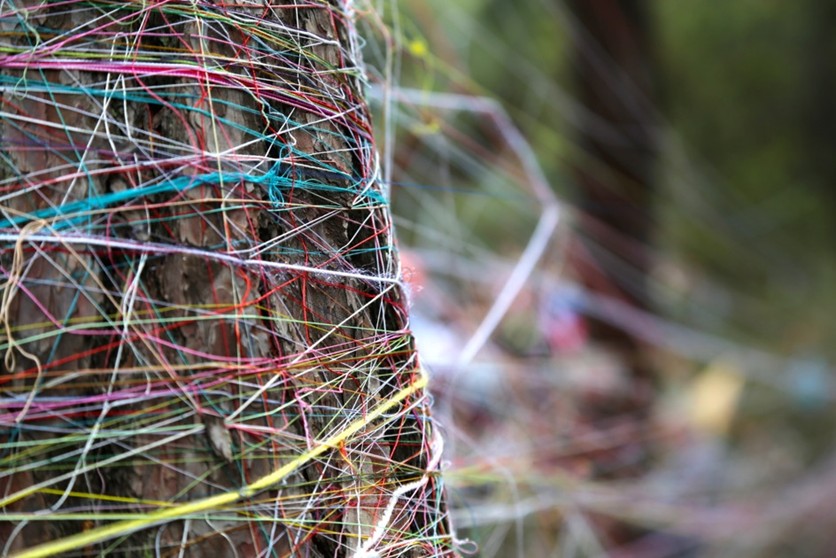
This international summer school, open to PhD and Master students from different disciplines, will focus on the phenomena of connections, porosities and interreligious interactions in the Mediterranean in general, with a particular attention on the Balkans. It will be organised around theoretical and methodological proposals, case studies, and experiences using visual, digital and multimodal approaches.
Applications should be made before February 28, 2025, at the following link: https://www.efa.gr/appel-a-candidatures-religious-interactions-juxtapositions-and-imbrications/
Program of the 6th International Doctoral Research Seminar
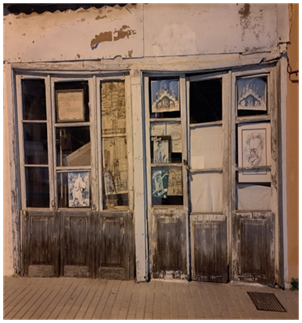
Culture, Borders, and Gender:
Interdisciplinary dialogues and pathways in a complex world
Hybrid format:
Conference Hall, University of Macedonia, Thessaloniki, Greece
&
ZOOM https://zoom.us/j/8364531775?pwd=OVg3YVZlbmVCYWs3S0JYcEFGYlV1QT09
Meeting ID: 836 453 1775 Passcode: KB2JKa
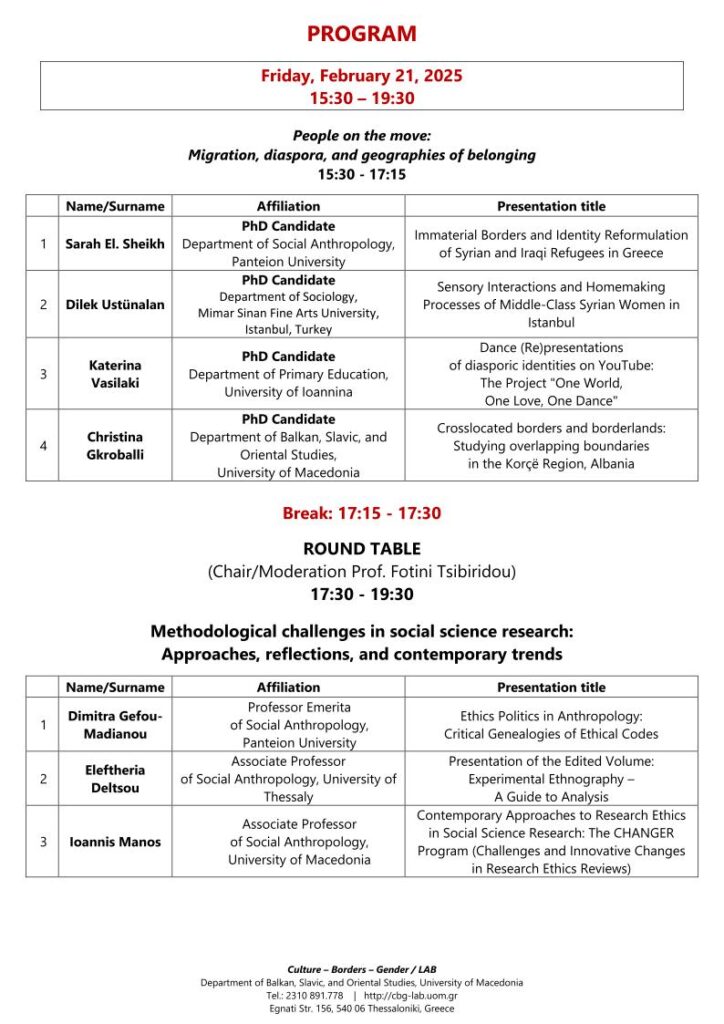
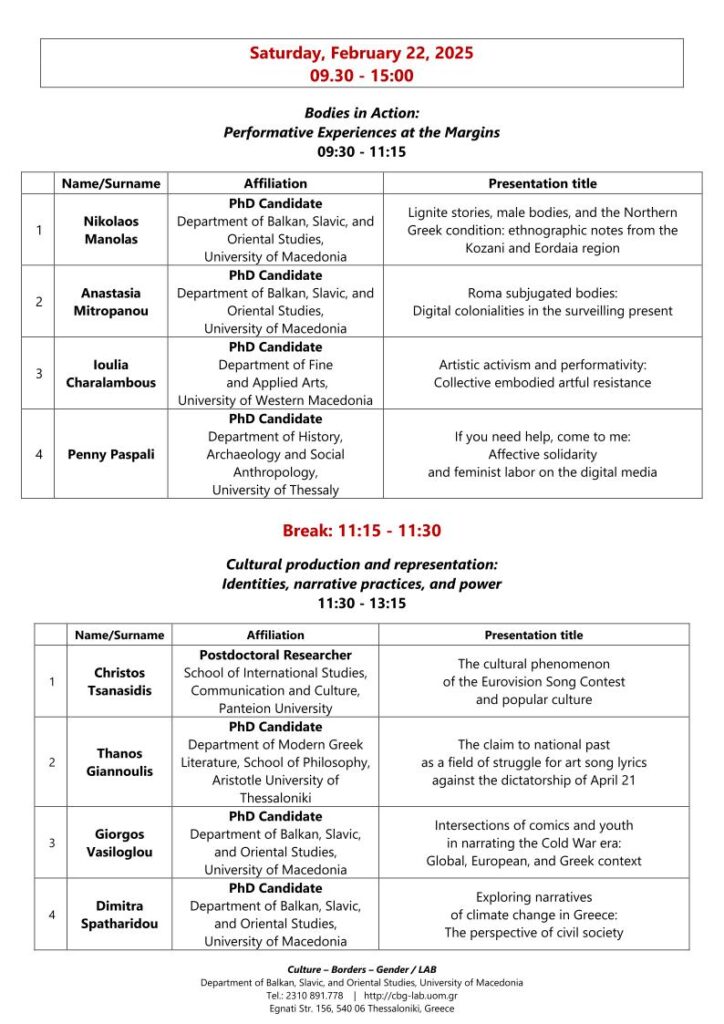
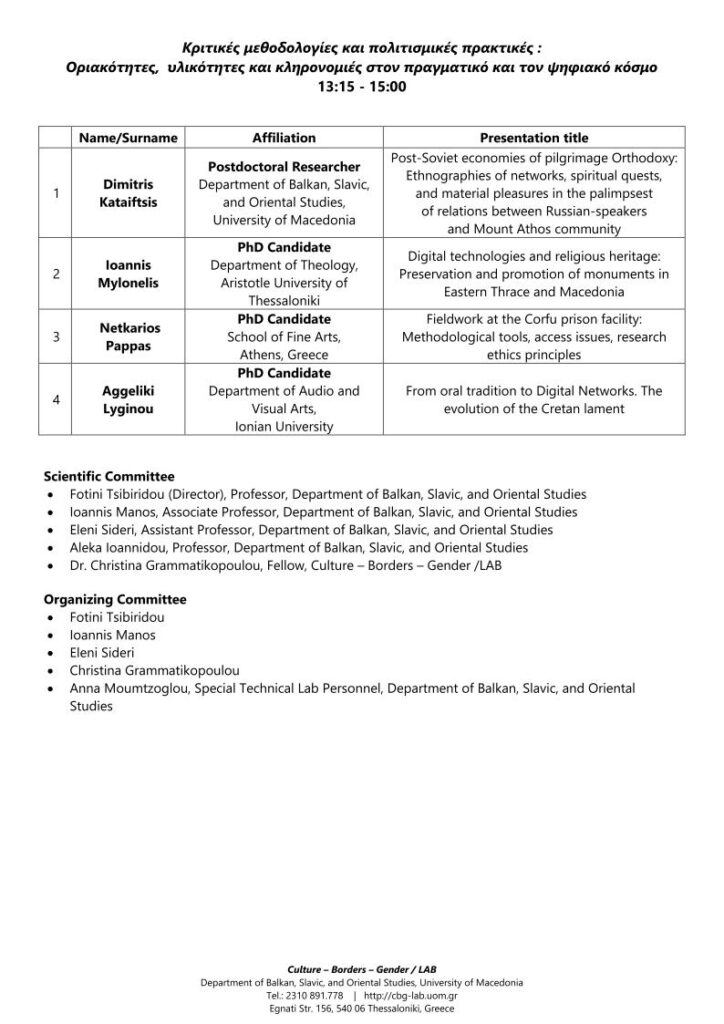
6th International PhD Seminar
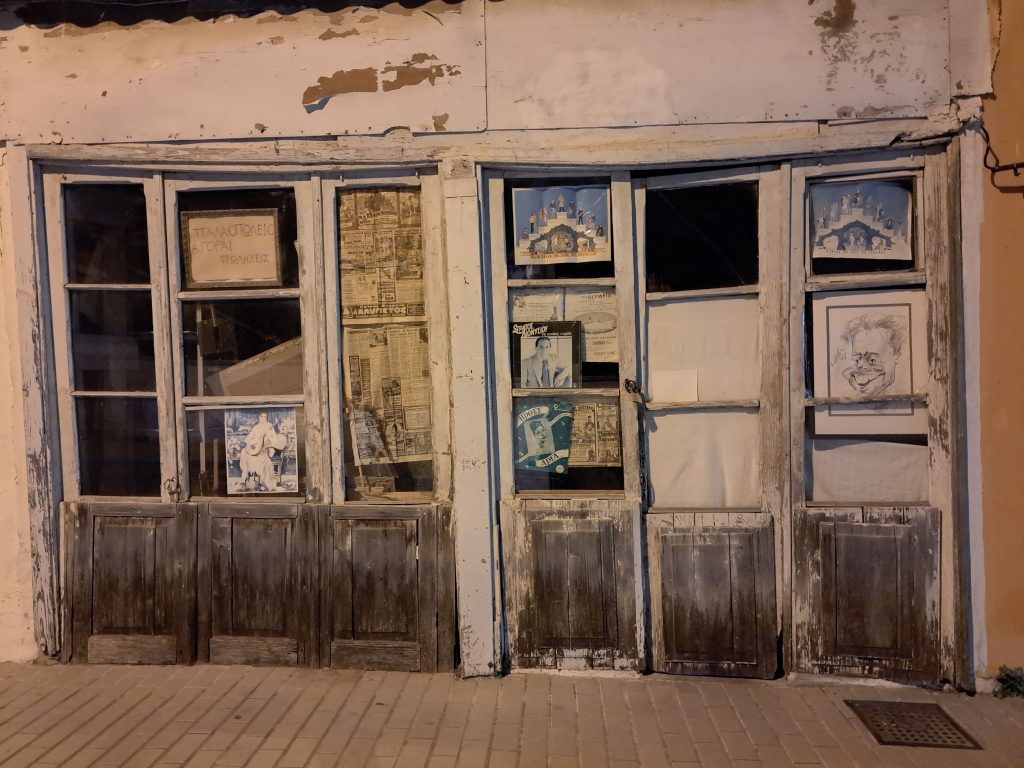
Culture, Borders, and Gender:
Interdisciplinary Dialogues and Pathways in a Complex World
February 21-22, 2025
University of Macedonia, Thessaloniki, Greece
CALL FOR PAPERS
The Culture-Borders-Gender/LAB invites PhD candidates and postdoctoral researchers to the 6th International PhD Seminar, a hybrid event on February 21–22, 2025, at the University of Macedonia in Thessaloniki, Greece. The seminar welcomes in-person and online presentations and participants, providing a forum for junior researchers to demonstrate their work in a collaborative and interdisciplinary environment.
It combines theoretical and methodological perspectives from social anthropology, cultural studies, border and gender studies, and digital technologies. It encourages participation in a broad academic dialogue, discussing pressing contemporary societal challengesand promoting the convergence of diverse scientific approaches.
We welcome submissions of case studies that explore, but are not limited to, the following themes and their intersections, offering fresh perspectives on the complexities of our contemporary world:
- Cultural practices, rituals, symbols, institutions, and discourses
- Border areas, identities, diversity, and cross-border mobility
- Experiences of minority groups, immigration, and refugees
- Gender dynamics, relations, and the concept of embodiment
- Crises: Humanitarian, environmental, economic, and more
- Studies in literature, art, language, and translation
- Material culture, space, and monuments
- Digitaltechnologies and audiovisualculture
Special Event
“Methodological Challenges in Social Science Research:
Approaches, Reflections, and Contemporary Trends”
Friday, February 21, 2025
University of Macedonia and Online (via Zoom)
Invited Speakers
“Ethics Politics in Anthropology: Critical Genealogies of Ethical Codes”
Dimitra Gefou-Madianou
Professor Emerita of Social Anthropology, Panteion University
“Presentation of the Edited Volume: Experimental Ethnography – A Guide to Analysis”
Eleftheria Deltsou
Editor of the Greek Publication
Associate Professor of Social Anthropology, University of Thessaly
“Contemporary Approaches to Research Ethics in Social Science Research: The CHANGER Program (Challenges and Innovative Changes in Research Ethics Reviews)”
Ioannis Manos
Associate Professor of Social Anthropology, University of Macedonia
Abstract Submission
- Abstracts should be no more than 250 words.
- Please provide a short bio detailing your academic qualifications and research interests, along with your contact details
- Submission Deadline: January 10, 2025
- Submission email address: cbg-lab@uom.edu.gr
- For further inquiries, contact Mrs Anna Moumtzoglou: anna@uom.edu.gr
Conference format, location, and other significant information
- The seminar will be held in a hybrid formaton the premises of the University of Macedonia,with onsiteand online participation via Zoom.
Πλατφόρμα Σεμιναρίων: ZOOM Link:
https://zoom.us/j/8364531775?pwd=OVg3YVZlbmVCYWs3S0JYcEFGYlV1QT09
Meeting ID: 836 453 1775 Passcode: KB2JKa
- Paper presentation: It should not exceed 15’
- Working languages: Greek, English
- A Certificate of Attendance will be issued to all participants of the seminar
Publication Prospects:
Selected papers will be considered for publication in special sections of the Culture – Borders – Gender / LΑBonline, open-access access, and peer-reviewed academic journals:
- Culture-Borders-Gender/Studies (https://tinyurl.com/msrbkxw2)
- EIRINI (https://tinyurl.com/5n8z8s52).
Scientific Committee
- FotiniTsibiridou (Director), Professor, Department of Balkan, Slavic, and Oriental Studies
- Ioannis Manos, Associate Professor, Department of Balkan, Slavic, and Oriental Studies
- EleniSideri, Assistant Professor, Department of Balkan, Slavic, and Oriental Studies
- AlekaIoannidou, Professor, Department of Balkan, Slavic, and Oriental Studies
- Dr. Christina Grammatikopoulou, Fellow, Culture – Borders – Gender /LΑB
Organizing Committee
- FotiniTsibiridou
- IoannisManos
- EleniSideri
- ChristinaGrammatikopoulou
- Anna Moumtzoglou, Special Technical Lab Personnel, Department of Balkan, Slavic, and Oriental Studies
CALL FOR PAPER SUBMISSIONS
“Culture-Borders-Gender: Critical Approaches to Issues of Knowledge, Ethics, and Technology”
INVITATION
The Culture-Borders-Gender/Lab of the Department of Balkan, Slavic and Oriental Studies –University of Macedonia and the Editorial Committee of the annual publication and open access electronic journal, “Culture-Borders-Gender/Studies” (https://ojs.lib.uom.gr/index.php/cbgs) invite submissions of original research papers for the volume 4 (2025).
THEME
The post-Covid era, combined with the broader developments of the last two decades in Europe and the effects of the post-memorandum condition in Greece, significantly accelerated the digitisation process. Digital technology became a central mediator of the production and management of knowledge, transforming all aspects of daily life.
The proliferation of electronic platforms normalised and simplified complex administrative and bureaucratic procedures. At the same time, it facilitated access to a vast volume of quantified data and formed new bodies of knowledge for scientific research (e.g., MegaData). Furthermore, digital governance turned to a mechanism of biopolitical control and assessment through which social practices are now experienced as a continuous lifelong process of digitisation and digital socialisation.
Although the dominant mechanisms of knowledge production proclaim equal and transparent access to information, they fail to ensure or guarantee these values for all. The multimodal possibilities of digital technology focus on non-discursive, more inclusive and dispositional aspects of knowledge, which are often considered more accessible and immediate but, at the same time, lack in-depth and critical insight.
The new digital reality reproduces stereotypes and binarisms, which derive from the dominant tendencies in Western epistemologies, to perceive the world in strict dichotomies, such as male/female, public/private, spirit/body, reason/emotion, Christian West/Muslim East, we/others. The unfortunate attempts to overcome this duality through the politics of multiculturalism within the Western world are enhanced by digital technology, which ends up feeding the normalisation of entrenched views of culture, gender-racial morality and knowledge as a whole.
For example, the Western-centric, modern nation-state continues, through mechanisms of integration, education and control, to forge the conscience of the citizens of the coming generations, propagating exclusive national, religious and gender identities. The phobic insistence on the dominant, conservative and patriarchal narrative and the reproduction of binarisms are evident in school textbooks. This approach fosters all forms of the modern “matrix” of colonialism (nationalism, religion, race, gender, etc.), ignoring local histories and the possibilities of critical reflection on the coexistence within diversity.
The discussion on gender-based violence and equality is limited to neoliberal practices of social justice and mechanisms of the rule of law and inclusion, despite the acknowledgement that gender is modernly constructed around the dominance of hegemonic white Christian masculinity-normativity. This leads to a continuous “war of correctness”, where Western patriarchal ethics, knowledge, and technology, both within and beyond the borders of the post-colonial West, are imposed, stigmatising cultures of solidarity and emotion as pathological. Responses seem to overlook the intersectional dimensions of patriarchy in the entanglement of gender and sexuality with race, nation, class, region, and, ultimately, Western colonialism. Moreover, they largely ignore critical reflection on how digital technology can colonise or decolonise the mind and body.
At the social sciences and humanities level, the knowledge produced by engaging qualitative research tools and interpretive methods is increasingly discredited. The deep understanding of human experience and cultural diversity is marginalised, de-historicised, and dehumanised in favour of the measurable and rapidly generated information, which is established as a priority and legitimised normality with (pseudo)undeniable evidential value. As a result, multi-level exclusions and social inequalities are shaped by insufficient inoculation with critical discourse and analytical thinking, as well as a deep understanding of the social, cultural, and ethical dimensions of the human experience.
We are inviting articles from the fields of social sciences and humanities, which stand up critically in the ways of how knowledge about culture, gender and borders is produced as they reflect on questions of ethics, technology and politics beyond the ethics imposed by technological mechanisms of audit and evaluation in the new digital era age of neoliberal capitalism. At the same time, we welcome studies which either multimodally, through a cultural, feminist and decolonial critique, or by engaging the methodologies of critical ethnography, highlight the possibilities of digital technology to create pathways of non-hypothesised, non-essentialist, more equal and inclusive knowledge on the ground and in practice.
IMPORTANT DATES
- April 15, 2025: Paper Submission
- June 30, 2025: Peer reviews and feedback to authors
- August 30, 2025: Submission of revised drafts
- November 30, 2025: Publication of papers
INSTRUCTIONS FOR SUBMISSION
- Papers can be written in either Greek or English.
- The length of papers should not exceed 6,000 words, including references and footnotes.
- Papers submitted must be original works.
- For bibliography and other formatting guidelines, please refer to the “Submissions” https://ojs.lib.uom.gr/index.php/cbgs/about/submissions
SUBMISSION AND INQUIRIES:
Dr. Christina Grammatikopoulou: christinagrammatikopoulou@gmail.com
Ε/ 5th Circle of Educational Webinars “Ethnografein” (2024-2025)
Ethnografein
Critical dialogues, epistemological challenges, field experiences, creative texts

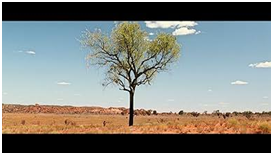
Original film title: Words with Gods collective 2014
Photos: selection F. Tsibiridou
“‘Religion’ in the ethnographic condition”
(Western ontology, ecologies of knowledge, gendered bodies that suffer, healing performances, sacred spaces, power relations, identity politics, subjects)
Since its launch, in the spring of 2021, ‘ETHNOGRAFEIN’ circle of webinars seeks to contribute to a critical and interdisciplinary debate on the theory and practice of ethnography, the epistemology of research, the importance of embodied experience, and the ways of disseminating the anthropological knowledge to the academic and non-academic public. It is required that anthropological study, as a research practice and as a writing policy, should involve critical appraisal, empathy, reflection and self-reflexivity, and highlight the importance of multimodal analysis of the local for understanding the general.
Organization and coordination
Fotini Tsibiridou – Ioannis Manos – Eleni Sideri
Organization and coordination of the 5th Circle
Fotini Tsibiridou – (in collaboration with Dimitris Kataiftsis)
The 5th cycle of “Ethnografein” webinars, starting in October 2024, entitled “’Religion’ in the ethnographic condition” (Western ontology, ecologies of knowledge, gendered suffering bodies, healing performances, sacred spaces, power relations, identity politics, subjects), includes 7 panels. It explores the religious phenomenon, opening the debate on how the question of religion needs to be deconstructed through the ethnographic condition and decolonized from the ontologies of the Western epistemological paradigm. The colonialities of modern citizenship and of nation/state sociality not only use religion instrumentally, both at the collective and personal level, but also crystallize the concept of religion spiritually and in one-dimensional terms, both beyond its materialities and narrowly in its anthropocentric character. Monotheism (in its Judeo-Christian and Muslim versions), colonialism and Western epistemology have systematically led to successive rationalizations of the concept of “religion”, as well as to its separation from the world of “magic”. This path leads to a Christian missionary ontology of knowledge in the context of Western colonialism, which creates deviations from the inclusive knowledge ecologies of the “noble savages” (see indigenous cults). The fact that anthropology and its related disciplines (see folklore studies) has pointed out the above very early on, has not prevented it in its colonial phase from reproducing Western-centric distinctions in their analysis. Earlier, since the time of Crusades, “religion” had begun to be conceptualized in a Western-centric way, as a synonym for “culture”, in an orientalist distinction of the Western Christian European world from the culturally Muslim Others of the East, while the Age of Discovery coincided with the Christian crystallization as segregation of religions in the European world (cf. Reconquista, persecution of Jewish populations, female witch-hunting).
The seminars aim to highlight how religion and the religious phenomenon need not only to be deconstructed but also decolonized in research and analysis. In terms of political economy and seeking ecologies of knowledge, the webinars highlight practices for gendered bodies that suffer, are at risk and demand healing and comfort, in places and communities which sometimes use religious discourse inclusively with the afterlife, the non-human world and the environment, sometimes and/or instrumentally for identity politics in the contemporary world. All of these are examined in situ, within networks of power relations and hegemonies from above or from outside, and require systematic documentation inside ethnography and epistemological revision in terms of decolonizing knowledge. In these ways, the deconstruction of stereotypes and demonization is achieved, but also the understanding of religious experience and interreligious expression, both: as process of enchantment and re-enchantment of an often mundane and harsh everyday life, and as potential constituent element of the constitution of the self/subject in the complex contemporary world.
The 5th cycle of the Ethnografein webinars includes approaches and ethnographic case studies that focus on the religious phenomenon and beyond, re-examining in the heavy shadow of Western epistemological, cultural and political hegemony the issues of shamanism, spirituality, transreligiosity, and more broadly worldview construction, in Africa, Asia, the Balkans and Anatolia, the European north, the Mediterranean and Latin America worlds. By focusing on the practices of social actors, their representations, expectations and desires, the boundaries and meanings of religious expression from within and from below, in the long term and in the geopolitical context, beyond the hypostatized stereotypical naming and representations of the Other, the alien, the heterodox and the strange, are unfolded.
The webinars are held on Mondays from 16:00-18:00
————————————————————————–
Seminar Platform: ZOOM
https://zoom.us/j/8364531775?pwd=OVg3YVZlbmVCYWs3S0JYcEFGYlV1QT09
Program
1st panel. 21/10/2024 4-6 μμ: Spiritualism, Sufism and missionary Churches in post-colonial Africa
Makris, G. (Η οδός των πνευμάτων, Σουφισμός κ πνευματοληψία στο Σουδάν)και Κυριακάκης, Γ. (Εκκλησίες, πίστη, θεραπεία στη Γκάνα)
2nd panel 11/11/2024 4-6 μμ : Muslim Brotherhood in Egypt and Popular Islam in the Pomak villages. Modernity, colonialities and rationalizations
Kourgiotis, P. (Αδελφοί Μουσουλμάνοι, αποικιοκρατία, νεωτερικότητα στην Αίγυπτο – Tsibiridou, F. (Λαϊκό Ισλάμ και μειονοτική συνθήκη στα Πομακοχώρια)
3rd panel 13/1/2025 4-6 μμ: Shared Sacred Places in the Balkans and Anatolia
Dionigi Albera (κοινά προσκυνήματα σε Βαλκάνια-Ανατολία) – Gilles de Rapper (Βακούφια και Πελασγοί στην Αλβανία).
4rth panel 17/2/25 4-6 μμ: Τransreligiosity, rituals, bodies, subjects in the old and the new world
Panagiotopoulos, Α. (για Afrocuban τελετουργίες) καιRoussou, Ε. (για το κακό μάτι στην Ελλάδα)
5th panel 17/3/25 4-6 μμ: Shamanism in Nepal and Anastenaria in the Balkans
Riboli D. (σαμανισμός στο Νεπάλ και Άπω Ανατολή) – Terzopoulou, Μ. (γυναίκες και μάνες στα Αναστενάρια)
6th panel 28/4/25 4-6 μμ: Pilgrimage faith and ethnic identities, from the Balkans to the Mediterranean world
Yiakoumaki, V. (υπάρχουν εβραίοι στα Χανιά;) και Katiƈ, M. (εθνικοποίηση της θρησκείας στη Βοσνία-Ερζεγοβίνη και τα Δυτικά Βαλκάνια)
7th panel 19/5/2025 4-6 μμ: New-shamanism in the European North and geo-mythology in contemporary Greece
Barmpalexis. Α. (νέο-σαμανισμός στη Σκωτία)και Ευγενία Φωτίου (γεωμυθολογία στην Ελλάδα)
Short CV’s
Fotini Tsibiridou, (Dr. of Ethnology-Social Anthropology, EHESS-Paris 1990), is professor of social anthropology in the department of Balkan, Slavic and Oriental Studies, and director of the Culture-Borders-Gender/Lab at the University of Macedonia (cbg-lab.uom.gr). She carried out ethnographic research in a refugee village of 1922, among Pomak populations and minorities in Greek Thrace, in villages in Macedonia, the Peloponnese, in Istanbul, in the Sultanate of Oman and more broadly in the Middle East and the Balkans. As of 2018 and in the context of postcolonial and feminist criticism, she explores the genre of religiosity, statehood, and gendered subjectivity in post-Ottoman topologies and geographies. Since 2020, as a founding member of the dëcolonıze hellàş initiative (https://decolonizehellas.org/), she has been dealing with issues of coloniality, postcolonial archives and cultural heritage, the decolonization of religion and gender as well as the defacement of patriarchy.
Dimitris Kataiftsis is Dr. in Cultural Studies (University of Paris-IV Sorbonne 2014) and external collaborator, teaching anthropology courses at the Department of Balkan, Slavic and Oriental Studies of University of Macedonia. Since 2010 he has been conducting field research in communities of returnees from the former USSR, in Greece and abroad, mostly focusing on gender and economic reproduction. During his last postdoctoral research he studied transnational networking, ethnic and cultural economies in the context of the Russian-speaking world and return migration, publishing articles in international journals and volumes and participating in international conferences. Finally, he actively participates in the scientific and editorial team of the journal EIRINI/Studies of Young Scholars on Gender, and in numerous activities of the Laboratory/Culture-Border-Gender (cbg-lab.uom.gr), at the University of Macedonia, as a regular member.
Ο Γεράσιμος Μακρής είναι καθηγητής Κοινωνικής Ανθρωπολογίας στο Πάντειο Πανεπιστήμιο, Αθήνα. Έχει διδακτορικό δίπλωμα στην Κοινωνική Ανθρωπολογία από το London School of Economics. Τα κύρια ερευνητικά του ενδιαφέροντα είναι η ανθρωπολογία των ισλαμικών κοινωνιών, η ανθρωπολογία του χριστιανισμού, η ελληνική διασπορά στη Μέση Ανατολή και η ανθρωπολογική μελέτη της θρησκείας. Βιβλία στην αγγλική γλώσσα: The Sudanese Zār Ṭumbura Cult: Slaves, Armies, Spirits and History. Λονδίνο: Routledge, 2023. Islam in the Middle East: Α Living Tradition. Malden: Blackwell Publishing, 2007. Changing Masters: Spirit Possession and Identity Construction among Slave Descendants and Other Subordinates in the Sudan. Evanston: Northwestern University Press, 2000. Βιβλία στην ελληνική γλώσσα: Ο Δρόμος των Πνευμάτων: Αθήνα: Σουφισμός, Πνευματοληψία και Μαγεία στο Σουδάν: Αθήνα, Πατάκης, 2016. Ισλαμ: Πεποιθήσεις, Πρακτικές και Τάσεις. Αθήνα, Πατάκης, 2014.
Ioannis Kyriakakis was born in Athens-Greece. He studied Political Science in Athens (Panteion University) and holds a pHD in Social Anthropology in London (UCL). He conducted fieldwork in England, in Ghana and Greece. He teaches in the Hellenic Open University. Ηis main interests revolve around methodology, religion/cosmology, global inequalities, economy and the anthropology of capitalism. In July 2020 his ethnography The Witchcraft of Capitalism-How Academy supports the global class system, was published. In 2023 his book Economic Anthropology and Capitalism and in 2024 his e-book Colonizing the Mind- The Witchcraft of the global class system (Syneditions) were published.
Panos Kourgiotis (Dr. of the Department of Political Sciences of the Aristotle University of Thessaloniki since 2013), is Assistant Professor at the Department of Balkan, Slavic and Oriental Studies, since 2024, specializing in the field of Area Studies (Middle East) and contemporary Islam. He speaks Arabic and Hebrew. Part of his PhD thesis has been published (in Greek) under the title The first youth of Islamism; discovering the Muslim Brotherhood and the world surrounding it, which is the first historical study devoted to the Muslim Brothers in the Greek bibliography. Between 2004-2007 he studied the Arabic language in both Tunisia and Syria, while in the latter he conducted field research which was published (in Greek) under the title ‘‘Inheriting the Umayyads? Globalization, resistance and coexistence in Bashar al-Asad’s Syria’’ in the collective volume Ethnography and Daily Life in ‘‘Our Near East’’ (2020). He has published in highly influential academic journals, such as The British Journal of Middle Eastern Studies, The Maghreb Review and Religions.
Dionigi Albera Dionigi Albera is an anthropologist and senior research fellow at the French National Center for Scientific Research (CNRS). He is based at the IDEAS (Institute of Ethnology and Social Anthropology, Aix-Marseille University). His research focuses on Europe and the Mediterranean, and his interests include migration, kinship and family, pilgrimage and interfaith mixing. He published Sharing Sacred Spaces in the Mediterranean: Christians, Muslims and Jews at Shrines and Sanctuaries (Indiana University Press, 2012), co-edited with Maria Couroucli, He is one of the curators of the touring exhibition Shared Sacred Sites held at the Museum of Mediterranean and European Civilizations in Marseille (Mucem, 2015), the Bardo Museum in Tunis (2016), the Macedonian Museum of Contemporary Art and the National Museum of Photography in Thessaloniki (2017), the National Museum of the History of Immigration in Paris (2017–2018) and the Museum of Confluences-Dar el-Bacha in Marrakesh (2018).
Gilles de Rapper is an anthropologist, currently Director of Modern and Contemporary Studies at the École française d’Athènes. He holds a PhD in Ethnology and comparative sociology (University of Paris X Nanterre, 1998) and a Habilitation à diriger des recherches in Anthropology (University of Toulouse Jean Jaurès, 2019). Since 1994, he has conducted numerous fieldworks in Albania and the Balkans. His work has focused on the coexistence of Christians and Muslims in southern Albania, on cross-border relations between Greece and Albania and on the effects of Albanian migration to Greece. More recently, he has been interested in the trajectory of photographs produced during the communist period in Albania and their role in the current perception of the communist past. Finally, he is interested in the history of theories on the origin of Albanians through the revitalization, since the 1990s, of the nineteenth century ideas making Pelasgians the ancestors of modern Albanians.
Anastasios Panagiotopoulos (PhD 2011, Department of Social Anthropology, University of Edinburgh, UK), has conducted research on Afro-Cuban religiosity, divination, spirit possession, and mediumship in Cuba and Spain. More recently, his research interests have been directed towards contemporary religiosity and spirituality, alternative therapy,metaphysical views, and secularism in Europe, especially in Spain and Greece. He has been a postdoctoral and, subsequently, a senior researcher at the Centro em Rede de Investigação em Antropología (CRIA) and FCSH-Universidade Nova de Lisboa, Portugal. Since May 2023 he is a distinguished researcher at the Department of Social Anthropology of the University of Seville, Spain.
Eugenia Roussou, (PhD in sociocultural anthropologist UCL, University of London, 2010), is a senior researcher at the Centre for Research in Anthropology (CRIA-Iscte), Lisbon, Portugal, and the Principal Investigator of the project ReSpell: Religion, Spirituality and Wellbeing: a Comparative Approach of Transreligiosity and Crisis in Southern Europe (https://respell.cria.org.pt), funded by the Portuguese Foundation for Science and Technology (FCT) and hosted by CRIA. She is the author of Orthodox Christianity, New Age Spirituality and Vernacular Religion: the Evil Eye in Greece. London: Bloomsbury (2021). She has edited collective volumes and special issues and has written extensively on the themes of religion and spirituality, vernacular and lived religion, religious pluralism, ritual healing practices, Complementary and Alternative Medicine (CAM), transreligiosity and spiritual elasticity, among others, with comparative ethnographic reference to Greece and Portugal.
Diana Riboli (PhD in Ethno-anthropological Sciences (University of Rome “La Sapienza”, 1996), is a professor at the Department of Social Anthropology of the Panteion University of Social and Political Sciences. From 1992 to date, she has conducted over twenty ethnographic studies in South and Southeast Asia (Nepal and Peninsular Malaysia), with a particular focus on the therapeutic, political and spiritual functions of ethno-medical systems among marginalized indigenous communities. Since 2019, she has been directing a research project examining the ecocosmological perceptions of minority and marginalized groups in the context of the recent rapid spread of Christianity and the significant increase in environmental disasters in Nepal. He has authored and co-authored over forty publications on a range of topics, including indigenous ethno-medical systems, concepts and responses to violence in egalitarian societies, cultural resistance of indigenous cultures, disaster anthropology, concepts of person and personhood in the philosophies of indigenous groups, and anthropological research methods.
Miranda Terzopoulou, Ethnologist/Folklorist, is a former researcher at the Greek Folklore Research Center of the Academy of Athens. She carried out many field investigations inside and outside Greece by traveling, experiencing and recording ethnographically. She has studied many aspects and patterns of popular culture and especially traditional music and folk rituals, working with various ethnic, linguistic, religious groups, minorities, women. She records and films, compiling an important archive of rare audio-visual material, while at the same time she publishes studies, drawing on its relevant topics.
Vassiliki Yiakoumaki (PhD, New School for Social Research, 2003) is Assistant Professor of Social Anthropology at the Department of History-Archaeology-Social Anthropology, University of Thessaly (Volos). Her research interests focus on ethnic groups and minorities, multiculturalist policies, religion/s, and Jewish identities. Her teaching focuses on matters of religion and the public sphere, Jewish identities in Greece and Europe, and “Middle Eastern” societies. Her current research area is contemporary Israeli society, and “Greek identity” among citizens of Israel with “Greek” origin.
Mario Katic (Associate Professor, Department of Ethnology and Anthropology, University of Zadar). makatic@unizd.hr. My areas of expertise concern pilgrimage, oral traditions, historical anthropology, and heritage. I am doing extensive ethnographic research in Bosnia and Herzegovina, Croatia, and Montenegro. I co-edited several books: Approaching Pilgrimage: Methodological Issues Involved in Researching Routes, Sites, and Practices (Routledge, 2023); Military Pilgrimage and Battlefield Tourism: Commemorating the Dead (Routledge, 2018); Pilgrimage, Politics and Place Making in Eastern Europe (Routledge 2014), Pilgrimage and Sacred Places in Southeastern Europe: History, Religious Tourism and Contemporary Trends (Lit Verlag, 2014).
Athanasios Barmpalexis (Ph.D. in Ethnology (and Folklore) Εphinstone Institute, University of Aberdeen, United Kingdom). His doctoral thesis was on “western” folk healers practicing contemporary shamanisms in the wider area of North-East Scotland. He currently is a postdoctoral researcher at the sector of Byzantine Literature and Folklore Studies at the National and Kapodistrian University of Athens,. He is also an Honorary Research Fellow and a Visiting Lecturer at the Elphinstone Institute, University of Aberdeen. His research interests are Scottish/Irish myths and legends, folk music in contemporary extreme metal music, oral traditions of resistance, and folk medicine, vernacular healing, and traditional witchcraft.
Η Ευγενία Φωτίου (Δρ. Πολιτισμικής Ανθρωπολογίας, University of Wisconsin-Madison, 2010) είναι
Evgenia Fotiou (Ph.D. in Cultural Anthropology, University of Wisconsin-Madison, 2010), is Assistant Professor in the Department of Sociology at the University of Crete, since 2023.. Her research has focused mainly on indigenous religions and healing traditions, especially their transnational aspects, as well as on the role of tourism, focusing geographically on Latin America and contemporary Greece. She has contributed to the ethnography of contemporary shamanic practices globally by analyzing the multiple aspects of the shamanic tourism phenomenon. More recently, her research addresses the critical interdisciplinary issues of knowledge systems, comparative epistemology, otherness, and cross-cultural translation. She specializes in ethnomedicine, the anthropology of religion, tourism, and gender and has taught courses on these topics at the University of Wisconsin-Madison, Luther College, and Kent State University in the United States.
References
Albera, D. and M. Couroucli, eds. (2012) Sharing Sacred Spaces in the Mediterranean: Christians, Muslims, and Jews at Shrines and Sanctuaries. Bloomington, Indiana: Indiana University Press.
Asad, T. (1993) Genealogies of Religion: Discipline and Reasons of Power in Christianity and Islam. London: Johns Hopkins University Press.
Asad, T. (2003) Formations of the Secular: Christianity, Islam, Modernity. Stanford, California: Stanford University Press.
Barmpalexis, Α. (2020) The Birth of The New Urban Shaman’s Oracle: The Creation and the Crafting Process of a Contemporary Tarot Card Deck for Personal and Community Healing and Transformation Εθνολογία on line 10(2) · Ethnologhia on line 10(2) ΕΛΛΗΝΙΚΗ ΕΤΑΙΡΕΙΑ ΕΘΝΟΛΟΓΙΑΣ (GREEK SOCIETY FOR ETHNOLOGY) ISSN: 1792-9628 19 https://www.societyforethnology.gr/images/volume-10-2/Vol_10(2)_2020_whole.pdf
Danforth, M. L. (1995) Tα αναστενάρια της Αγίας Ελένης. Πυροβασία και θρησκευτική θεραπεία. Αθήνα: Πλέθρον.
Fotiou, E. “Transreligiosity and Religious Revitalization in Modern Greece: Bridging Religion and Science through Geomythology”. Religions 2023, 14, 754. https://doi.org/10.3390/rel14060754
Geertz, C. (1973) “Religion As a Cultural System.” in The Interpretation of Cultures: Selected Essays, pp. 87-125. New York: Basic Books.
Federici, S. (2019) Το κυνήγι μαγισσών χθες και σήμερα. Θεσσαλονίκη: Εκδ. των ξένων.
Hayden, R.M., Katić, M. (2021). Religiously Nationalizing the Landscape in Bosnia and Herzegovina. In: Bădescu, G., Baillie, B., Mazzucchelli, F. (eds) Transforming Heritage in the Former Yugoslavia. Palgrave Studies in Cultural Heritage and Conflict. Palgrave Macmillan, Cham. https://doi.org/10.1007/978-3-030-76401-2_9
Kenna, M. E. (2015) «Rituals of Forgiveness and Structures of Remembrance: Memorial Services and Bone Depositories on the Island of Anafi, Greece», History of Religions, Vol. 54, No. 3 (February 2015), pp. 225-259 Published by: The University of Chicago Press Stable URL: http://www.jstor.org/stable/10.1086/678993 .
Κυριακάκης Γ. (2012) “Υγεία, Πίστη και Μεθοδολογία: μια εθνογραφική μαρτυρία από την Δυτική Αφρική”, στον τόμο Ανθρωπολογικές και κοινωνιολογικές προσεγγίσεις της υγείας.
Σπυριδάκης M.-Οικονόμου, X. (επιμ.) Αθήνα: Εκδόσεις Σιδέρη. Σελ. 361-379.
Κουργιώτης, Π. (2016) Η πρώτη νιότη του ισλαμισμού. Ανακαλύπτοντας τη μουσουλμανική αδελφότητα και τον κόσμο της (1928-1948). Θεσσαλονίκη: Ζήτρος
Μακρής, Γ. (2024) Η οδός των πνευμάτων: Σουφισμός, πνευματοληψία και μαγεία στο Σουδάν. Αθήνα: Πατάκης
Nye, M. (2019) “Decolonizing the Study of Religion”, Open Library of Humanities 5(1), 43. doi: https://doi.org/10.16995/olh.421
Obadia, L. (2008) Ανθρωπολογία των θρησκειών. Αθήνα: Πολύτροπον.
Panagiotopoulos, A (2017) A secular religion within an atheist state: The case of Afro-Cuban religiosity and the Cuban state. In: Mapril J, Blanes R, Wilson E, Giumbelli E (eds) Secularisms in a Postsecular Age? Religiosities and Subjectivities in Comparative Perspective. London; New York: Palgrave Macmillan, pp.39–65.
Panagiotopoulos, A., & Roussou, E. (2022) «We have always been transreligious: An introduction to transreligiosity». Social Compass, 69(4), 614-630. https://doi.org/10.1177/00377686221103713
Pénicaud Manoël (video για τον τεκέ στα Φάρσαλα) (https://www.youtube.com/watch?v=9viJwlDkoP0&t=2s).
De Rapper, G. (2012) «Τhe Vakëf: Sharing Religious Space in Albania», in Dionigi Albera, Maria Couroucli (eds) Sharing Sacred Spaces in the Mediterranean. Bloomington and Indianapolis, Indiana University Press, pp. 29-50.
Riboli, D. (2008) Tunsuriban, Ανθρωπολογική μελέτη του σαμανισμού των Chepang του νοτίου και Κεντρικού Νεπάλ. Aθήνα:εκδ. Παπαζήση
Roussou, E (2021) Orthodox Christianity, New Age Spirituality and Vernacular Religion: The Evil Eye in Greece. London: Bloomsbury.
Σερεμετάκη, Ν. (2017) Η τελευταία λέξη στης Ευρώπης τα άκρα. Δι-αίσθηση, Θάνατος, Γυναίκες. Εκδοτικός Οίκος Α Α Λιβάνη.
Santos, B. de Sousa (2014) “Ecologies of Knowledge,” pp. 185-211 in Bonaventura de Sousa Santos, Epistemologies of the South: Justice Against Epistemicide. New York: Rutledge.
Τερζοπούλου, Μ.(2023) «Όσο κρατάει ένας στεναγμός. Ανασύροντας από το έρεβος την κακή μάνα» (149-174) στο Θέατρο-Τραύμα-Θεραπεία, Ι. Βιβιλάκης (επιμ.) Αθήνα: εκδ. Αρμός.
Tsibiridou, F. (2015) «Beyond the politics of religion: Rationalizing Popular Islam among the Slavonic-Speaking Muslims in Greece”, in Balkan Heritages. Negotiating History and Culture, edited by Maria Couroucli and Tchavdar Marinov. Surrey: Asghate 2015: 209-228. https://www.academia.edu/36171007/Beyond_the_politics_of_religion_Rationalizing_popular_Islam_among_the_Slavonic_speaking_Muslims_in_Greece_pdf
Turner, E. and V. Turner (2011) Image and Pilgrimage in Christian Culture (Revised Edition). New York: Columbia University Press.
Turner, V. (2017) Ritual Process: Structure and Anti-Structure. Routledge, 2017.
Van Gennep, A. (2019) The Rites of Passage. Second Edition. Chicago: University of Chicago Press
Yiakoumaki, V. (2009) “Υπάρχουν Εβραίοι στα Χανιά; Περί απουσίας, παρουσίας, και επίκτητης εμπειρίας της ετερότητας” [=“Are There Jews in Chania? On Absence, Presence, and the Acquired Experience of ‘Difference’”]. In F. Tsibiridou (ed) Μειονοτικές και μεταναστευτικές εμπειρίες: Βιώνοντας την “κουλτούρα του κράτους” [=Minority and Immigration Experiences: Εxperiencing the ‘Culture of the State’]. Athens: Kritiki, pp. 255-28
Webinar: FEMALE GENEALOGIES-FEMALE CREATIVITIES
This seminar is part of a project that has received funding from University Of Macedonia Research Fund under the Basic Research 2023 funding programme
14/10/2024
16.00-18.00
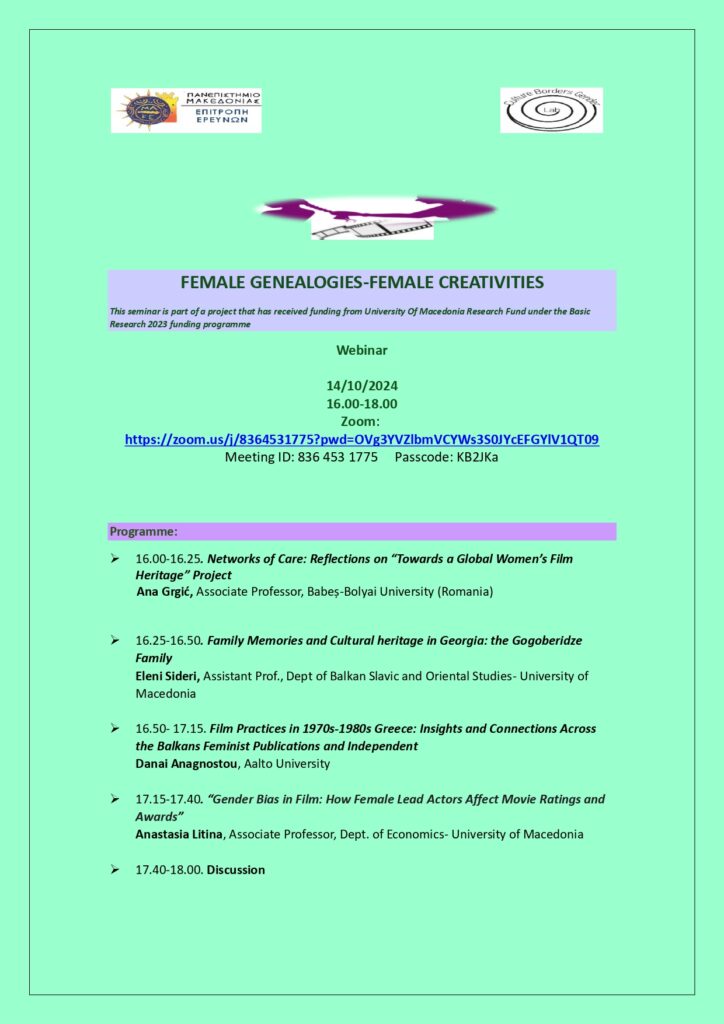
Zoom: https://zoom.us/j/8364531775?pwd=OVg3YVZlbmVCYWs3S0JYcEFGYlV1QT09
Meeting ID: 836 453 1775 Passcode: KB2JKa
Patriarchal structures have caused gender segregation and socio-political and economic inequalities for women for centuries. They also contributed to the formation of female intimacies, networks and solidarities which tried to overcome the impediment of being a woman in “a man’s world”. The webinar will explore how shifting our attention to female genealogies as narratives, histories and/or practices of sharing, caring and support could help address the challenges that women in cultural industries, especially cinema, face. What kind of ingenuities do women conceive, develop in order to overcome social, economic or cultural obstacles? In what way, do they use their creativity to fight against structural and social handicaps? How do the successes or even failures of other women contribute to the production of female genealogies?
Programme:
- 16.00-16.25. Networks of Care: Reflections on “Towards a Global Women’s Film Heritage” Project
Ana Grgić, Associate Professor, Babeș-Bolyai University (Romania)
- 16.25-16.50. Family Memories and Cultural heritage in Georgia: the Gogoberidze Family
Eleni Sideri, Assistant Prof., Dept of Balkan Slavic and Oriental Studies- University of Macedonia
- 16.50- 17.15. Film Practices in 1970s-1980s Greece: Insights and Connections Across the Balkans Feminist Publications and Independent
Danai Anagnostou, Aalto University
- 17.15-17.40. “Gender Bias in Film: How Female Lead Actors Affect Movie Ratings and Awards”
Anastasia Litina, Associate Professor, Dept. of Economics- University of Macedonia - 17.40-18.00. Discussion
Abstracts:
- Networks of Care: Reflections on “Towards a Global Women’s Film Heritage” Project
Ana Grgić, Associate Professor, Babeș-Bolyai University (Romania)
This talk reflects on the aims, challenges and outcomes of the project “Global omen’s Film Heritage, on which I collaborated with my colleagues Stefanie van de Peer and Lizelle Bischoff. Our desire was to counter the dominant patriarchal attitude of “benign neglect” (Tucker 1983) to presences and absences in the archive, which diminishes and neglects women’s activities and labour in film history. This project brought together scholars, archivists and filmmakers, to address the gaps in our shared histories and knowledge, with a particular focus on women’s cultural memory and film heritage from the Global South. This reflection takes into account two years of networking, workshops and conferences, where women from across the globe met and shared passions, frustrations, knowledge and experiences on their encounters with or in film archives and restoration projects. At the intersection of feminist, anti-racist and anti-colonial studies, and through a self-reflexive and critical approach to our own work and activities, we sought to address questions surrounding the gaps in historical knowledge on women’s activities (especially non-White feminist film history), the unremembered, and the selectivity of cultural memory. I argue that our work and research as a women’s collective constitutes one example of the need and effort to decolonize film history in an active feminist way through “an ethics of care” (Thompson 2015).
- Family Memories and Cultural heritage in Georgia: the Gogoberidze Family
Eleni Sideri, Assistant Prof., Dept of Balkan Slavic and Oriental Studies- University of Macedonia
Three generations of women creators of Georgian cinema belonging to the same family, the Gogoberidze family, will form the basis for this research, which aims to explore the notion of female genealogy through a multimodal ethnography. What type of memories does this female genealogy shape and how is it shaped by them? Focusing on a specific example of (auto)biography-memory, I will try to explore the ways affective memory and emotions as well as creativity generate family and cultural heritage and shape a female genealogy.
- Film Practices in 1970s-1980s Greece: Insights and Connections Across the Balkans Feminist Publications and Independent
Danai Anagnostou, Aalto University
This contribution addresses persistent issues related to the documentation and accessibility of alternative film production histories and draws inspiration from the enduring legacies of historical film collectives. In my doctoral research, I delve into the historical facets of film collectives and group formations in cinema by examining archival materials, auto-theoretical texts, and publications related to film practice and production culture. I seek materials authored by filmmakers and film workers themselves. Employing Production Studies as a theoretical framework, I explore existing scholarly analyses of film production. However, there is a notable absence of texts on film production histories and critical perspectives authored by practitioners actively involved in filmmaking. This realization led me to auto theory—the blending of theory, philosophy, and autobiography (Fournier, 2021)—which shifted my focus toward locating texts and communication artifacts created by filmmakers themselves. Early in my research, I encountered several Greek independent feminist publications, such as Skoupa (Broom, 1979–1982), Musidora (1984–1985), and Poli Gynaikon (Women’s City, 1982–1985). The authors of these publications address a wide range of topics and occasionally contain critiques, manifestos, and calls for action relating to film praxes. While these publications often seem influenced by Western perspectives, my research aims to explore how feminist discourse and initiatives shaped independent filmmaking in Greece and other Balkan regions. Specifically, I seek to identify discourse and dissemination practices of short and hybrid film formats within feminist circles during that era. The literature review centers on examining independent publications that address film production and culture from the perspective of feminist groups primarily from Greece, engaged in archival research and reviewing relevant materials. Furthermore, the study explores whether these groups have taken a step further in organizing independent and short film exhibitions and screenings. Writing and taking control of one's narrative, whether individually or collectively, is seen as a means of healing and bringing everyday working life into theoretical discourse. Positioned at the intersection of Production Studies, histories of film collectives, and auto theory, my research endeavors to bridge documentation gaps, foster cross-generational dialogues about diverse approaches to filmmaking, and ultimately preserve the histories of independent film production.
- “Gender Bias in Film: How Female Lead Actors Affect Movie Ratings and Awards”
Anastasia Litina, Associate Professor, Dept. of Economics- University of Macedonia
The study looks at how movies with female lead actors are rated and how many awards they win. It finds that when a movie has one or two female leads, it tends to get lower ratings from viewers but wins more awards. However, when all three leading roles are filled by women, this pattern fades, and the movie’s ratings and awards don’t change much.
The study suggests that men tend to give lower ratings to movies with female leads, which could hint at some bias. Interestingly, when female involvement is less obvious, like when a woman is a producer, the movie tends to get higher ratings. This points to the possibility that when female roles are less visible, people rate the movie more favorably, hinting at underlying gender bias.
In conclusion, understanding gender diversity and its impact on film ratings and awards provides valuable insights into the broader dynamics of the movie industry. As representation continues to evolve, recognizing how gender perceptions influence both audience reception and critical acclaim is crucial for fostering a more inclusive and equitable film sector. This understanding is not only relevant for addressing bias but also for promoting diversity, which can lead to richer and more varied storytelling that resonates with diverse audiences.
Bios:
Danai Anagnostou is a researcher in production studies. She studies film collectives and their influence on contemporary conducts and strategies for producing films, and works on her doctoral thesis at Aalto University, funded by Kone Foundation. She has co-founded Kenno Filmi, a cooperative production company, invested in producing artist-led films and audiovisual works
Ana Grgić (PhD, University of St Andrews) is Associate Professor at Babeș-Bolyai University (Romania), specialising in Balkan and East European cinemas, women’s film heritage, visual culture and film history. She is author of Early Cinema, Modernity and Visual Culture: The Imaginary of the Balkans (Amsterdam University Press, 2022), and co-editor of Stretching the Archive – Global Women’s Film Heritage (Archive Books, 2024) and Contemporary Balkan Cinema: Transnational Exchanges and Global Circuits (Edinburgh University Press, 2020).
Anastasia Litina is an Associate Professor at the University of Macedonia in Thessaloniki, Greece and an Extramural Research Fellow at the University of Luxembourg. She received her Ph.D. in Economics at the University of Macedonia, visited Brown University for a semester and worked at the University of Luxembourg as a post-doctoral researcher prior to her employment in Greece. Her research interests include a theoretical and empirical examination of the long-run determinants of growth, on the implications of various dimensions of culture (e.g., corruption, religiosity, environmental attitudes) for socio-economic outcomes, the social implications of population aging, as well as on the long-lasting effect of historical events on current socio-economic outcomes.
Eleni Sideri completed her PhD in Social Anthropology at SOAS/University of London. She did extensive field research in the Caucasus, the former Yugoslavia and Greece. She taught social anthropology in various departments and has published in several languages. Her academic interests include: ethnographies of the Black Sea and the Caucasus, transnational migration and diasporas, politics of culture in cinema. In 2023, she published the monograph of Coproducing Europe. An Ethnography of Film Markets, Identity and Creativity (Berghahn Publishers)
The European Non-Territorial Network
The European Non-Territorial Autonomy Network is a COST Action aimed at examining the concept of non-territorial autonomy (NTA). ENTAN particularly focuses on NTA arrangements for reducing inter-ethnic tensions within a state and on the accommodation of the needs of different communities while preventing calls to separate statehood.
The main objective is to investigate the existing NTA mechanisms and policies and to develop new modalities for the accommodation of differences in the context of growing challenges stemming from globalisation, regionalisation and European supranational integration. The network fosters interdisciplinary and multidisciplinary group work, and provides for training and empowerment of young researchers, academic conferences and publications, as well as for the dissemination of results to policy makers, civil society organisations and communities.
Website: http://www.entan.org

